Follow the bass: An interview with Laura Lee of Khruangbin
Music — 23.10.20
Words: Silken Weinberg
Photography: Donavon Smallwood
Stylist: Silken Weinberg
Stylist Assist: Imaan Sayed
Beauty: Mia Varrone
Collage Artwork & Layout: Angela Ricciardi & Silken Weinberg
Super 8 footage: Angela Ricciardi
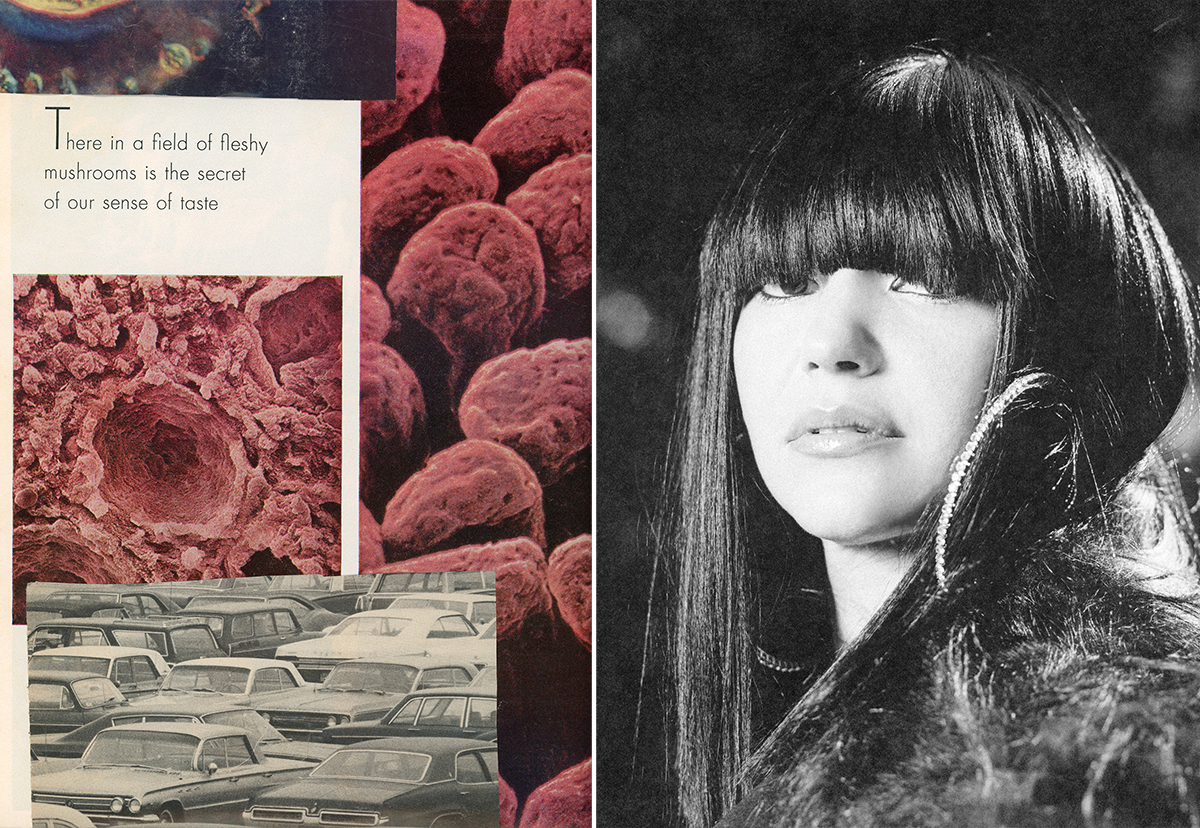
Feather Scarf Ann Demeulemeester, Coat Issey Miyake, Earrings AREA
In a year of perpetual postponing, your YouTube history might read like a list of Glastonbury sets, that video of David Gilmour playing Wish You Were Here at Pompeii, Radiohead Bonnaroo ‘06, or you might find yourself scrolling your own iPhone footage from concerts of yesteryear. A dear friend of mine recently sat me down to watch D.A. Pennebaker’s masterful documentary Monterey Pop, which serves as an important reminder as to how vital collective experiences truly are. Not only for our own individual fulfilment but as a whole – for a generation’s taste and appreciation for things that are real, right in front of us, working together.
A leading force in this invitation to listen and observe, feel, and experience is musical trio Khruangbin. A constant on the festival circuit and having been on tour for most of the last 3 years, Khruangbin has become known for their immersive live show that puts emphasis on the band members themselves. With Mark Speer on guitar, DJ Johnson on Drums and Laura Lee on Bass, to watch them perform live, is to see them.
In this exclusive interview with Teeth Magazine, Laura Lee dives into the band’s creative evolution, the symbiotic relationship between fashion and music and the beautiful anomaly of being a band.
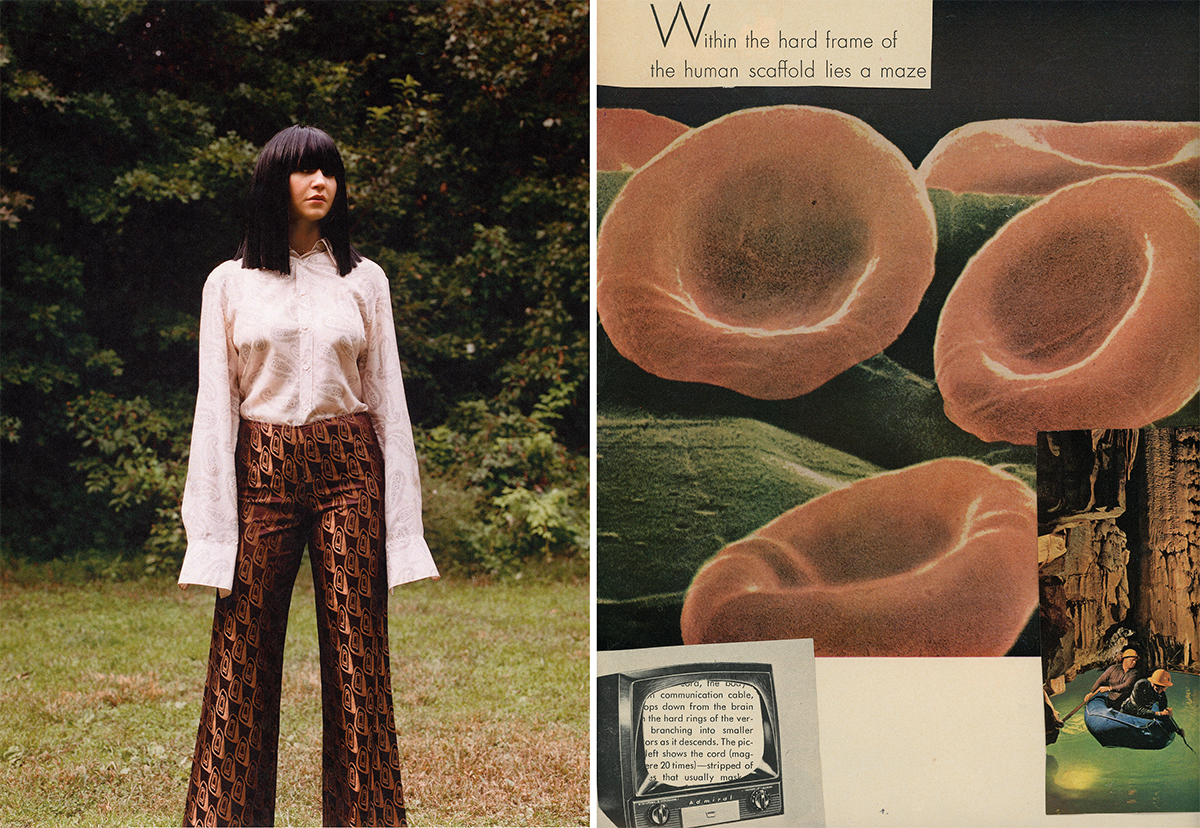
Blouse Miu Miu, Trousers Jean Paul Gaultier
You all have been touring constantly for the past several years. How has this pause affected you?
Yeah, I mean, it’s really sort of strange, because, in some way, my revelation when the album was being made, and the songs were being written, was kind of about that. It was about wanting to slow down a little bit, and wanting to stop and smell the roses because I was just zooming past them. Wanting to make sure you have time to enjoy the journey; we were moving at such a pace that it’s like, I think I’m enjoying this, and now in reflection, I totally was. I knew I just needed to get my head a little more balanced and I feel like I’ve gotten a lot of that this year.
Finding the time to just sit with yourself.
100%, just nurturing yourself. Making yourself breakfast, making yourself dinner. The simple things that I hadn’t been able to do for a long time. You realise how caught up you are in the whole thing. I watched the Social Dilemma this week and I’ve had my notifications off for a really long time so I’ve been on board with this plan. You don’t realise how taken away with all of these things you are. Just like chopping an onion and doing these little things every day are actually really important, nurturing yourself.
I feel very fortunate that the first time I ever heard Khruangbin was during a live show, you all instantly caught my attention at Outside Lands a few years ago… I’m really hoping 2021 happens.
Me Too. It’s going to look different no matter what, but I’m definitely hopeful that live music will come back.
I obviously miss playing it, but I also miss watching it. I was able to see so many shows, especially with festivals, I was always out there and it’s super inspiring to watch other people play. I think that a lot of that inspiration just feels like it’s on pause because there’s another thing about being present that you don’t want to plan too much for something that is uncertain.
Let’s talk about Mordechai. It was recorded in a barn and I can’t help but feel a connection to nature while listening to it.
Everything that has come out just as Khruangbin has been made in the barn, it’s the fourth member of the band. I think, sort of flowing with nature in a way because the barn is not insulated, ya know, it’s essentially just a roof. The doors can all be open if you want them to be open. You’re really like out in the field and there are so many sounds out there. There are bees and cows, and wind rattling the barn, all those sounds that you don’t hear in a city, things that you would have to be quiet to hear. I think when you’re in a studio that is completely quiet and sterile by design, you feel the need to fill up space with sound because there is no other sound happening. Whereas when we’re writing outside, there is actually a lot of sounds that are already there. We’ve always felt less inclined to put too much because then we’re not hearing everything else that’s happening. That kind of plays a part in the way we write.
For Mordechai, we did that same thing. We were between tours and went out to the barn to set up shop. We didn’t really have anything prepared in terms of songs for the album; our engineer always says, you finish a record because you run out of money or you run out of time. But when we slowly write songs out there, sometimes they are complete as they are and sometimes they do need additional vocals or another instrument etc. And so we recorded those songs, put them on the back burner, and went back on tour for a few months. It was then, at the end of that when I went on a hike with Mordechai and had this full experience. I’d written all this stuff in my journal and when we went back to work on the album for the second portion, a lot of the songs needed something else. That was when it was like, well, it’s vocals, I’ve got all the stuff I’ve written, so maybe something will work. It kind of takes on a life of its own. It’s sort of like viewing an album as a painting, you start to put some red on one corner, well then you might need a little bit of red in the bottom to balance it out. Once two of the songs had vocals, then more songs needed vocals.
You gave it all a chance to breathe.
We made a point to not listen because then you can have a different perspective going back in, It’s really easy to get so immersed in something you can’t, like, see the wood from the trees, because you’ve been listening to the same song for years on repeat. It doesn’t sound the same anymore. So yeah, we went back to it fresh and some of the songs that we didn’t think would make it actually did.
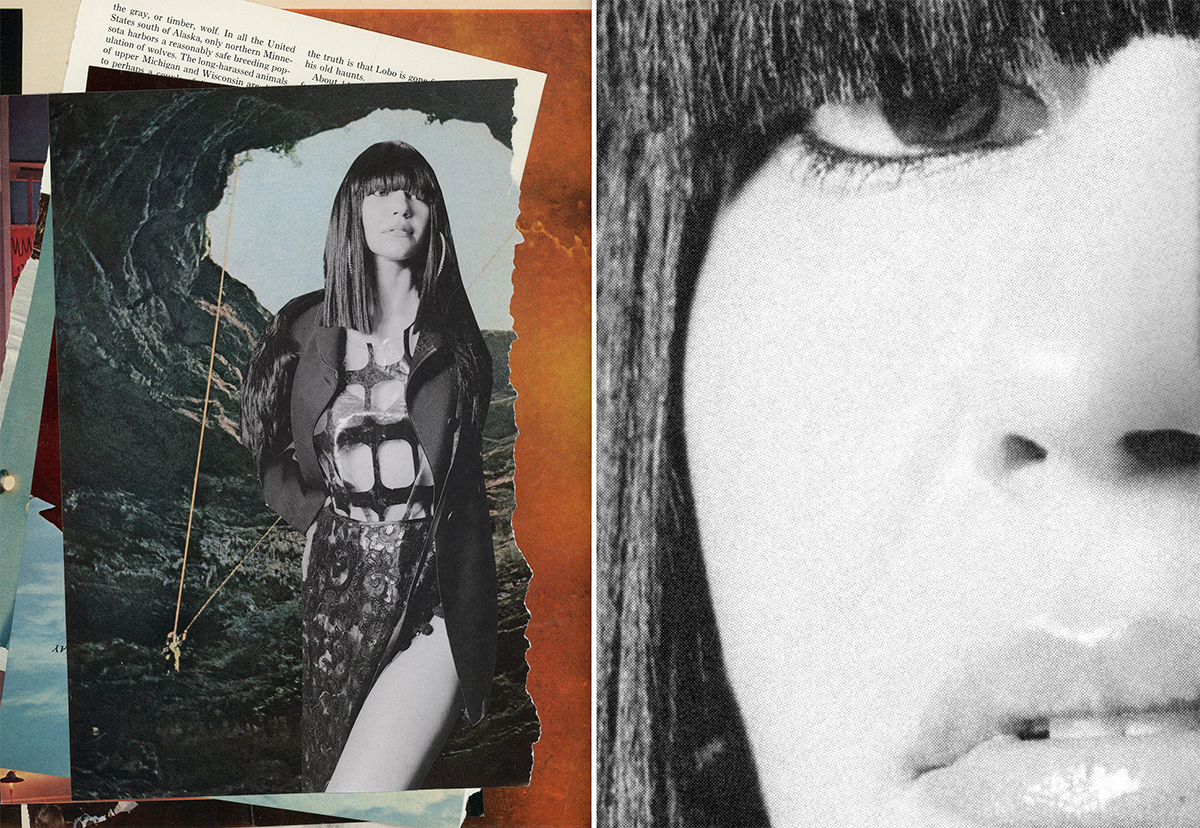
Feather Scarf Ann Demeulemeester, Coat Issey Miyake, Transparent Vest Comme Des Garçons, Skirt ____, Earrings AREA
Do you think you’ll continue writing vocals and drawing from your own experiences?
I think it’s definitely a new tool in the toolbox. Whether or not it becomes a necessary tool, we’ll see when the next one comes. The only real rules of Khruangbin is that it’s bass, guitar, and drums. Those are the three things that have to happen. We’ve kind of decided that they just have to happen live in the barn. That’s the foundation and everything else is up for grabs. I think with this particular record, that’s just what happened. Mark ended up playing a lot of rhythm guitar parts, which allowed room for vocals to sit whereas if he’s playing more melodic, solo type things, then there’s less of a place for it. In prior albums when that was happening, he acted as a vocalist in a way. We were doing a lot more “oohs and ahhs” because that‘s what there was space for. It’s all a conversation and it depends on what happens in that conversation, what the song wants. If you’re cooking, and you’re like, well, this needs salt, it’s the same sort of thing.
How did you find bass?
I played the piano when I was little and then I tried to pick up guitar in high school and it just didn’t stick. I was hanging out with Mark, and he has every instrument ever, ever. He had a bass and was actually showing me something on the piano when he was just like, listen to where the bass is going, follow the bass. I was like I can’t hear the bass so maybe I should just learn bass…it sort of came out of this silly conversation. I started playing, and was like, oh, this is like home. It felt really natural to play it.
I think there’s something you know, like for Mark and DJ, they’ve been playing forever, when they were kids it was something they naturally gravitated towards, they’ve always been connected to music and I’d say they’re both specialists. They live and breathe music, whereas I like cooking and painting, all kinds of stuff. I’ve never had just one specific interest. I think as a kid, my parents were pretty good about letting me try different things. But when you think about being groomed for one thing, like if you go to school really young for something really specific, you usually don’t know what you want for a long time.
Having such a variety of interests with a unique, natural path to the bass brings a really special element to the mix, especially when it’s combined with DJ and Mark.
Yeah, it’s a really special thing to just collaborate on something. When the relationship feels natural like it does between the three of us, it’s a special thing and music as a whole has always been a big part of my life. I’ve always loved going to shows. I love standing in a room and listening to the same song as everyone and enjoying it and celebrating it. I love that and I love traveling, I always wanted to see the world as a kid. Somehow, I’ve found the perfect job.
It all seems to be pretty aligned and I think it’s so refreshing that you’re a band. This level of collaboration isn’t very common.
Definitely, I don’t even think I realised it was happening. I started noticing it on festival lineups, I would kind of look and be like, we’re actually like, one of the only bands. That’s just a natural progression of, you know, humanity and what’s happened. It’s much easier to not be a band from a relationship standpoint, from a financial standpoint. It’s much easier to be one person and to hire a band to tour with you, or easier to just be a one-man show. But the spirit of music is about coming together and having this thing so if you have a band, where you’re embodying that spirit, it’s really special.
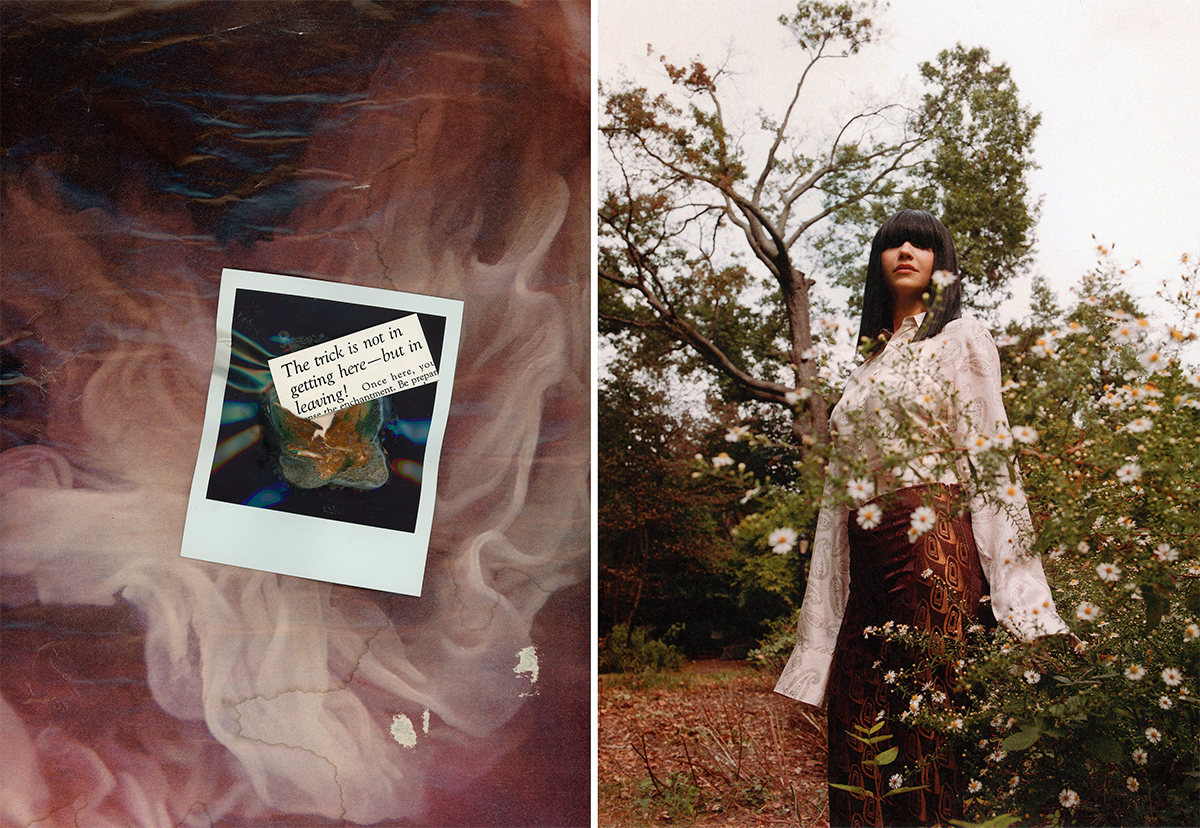
Blouse Miu Miu, Trousers Jean Paul Gaultier
There’s such a physical, experiential element to the band. From the music to the fashion…
Fashion plays a big part in Khruangbin. Khruangbin is as much a visual art project for me as any other aspect because it has that capability. I love shows, big, showy entertaining shows.
At the start, we were fully instrumental. And the thing that people tend to engage with at a show is the singer because it’s the easiest thing to connect to. If they’re singing you can hear the voice, not everybody can pick out drums and guitars, next-level listening. We were like, well how do we create that same engagement instrumentally and so one of those things was outfits and making sure that we were presenting ourselves in a way that seemed to connect with the music.
The hair was really because we wanted to be aliens in our own city. Everybody knew who we were just as people, and it was a way for us to get on stage and have nobody know who we were. Now it’s kind of the opposite. Now, it’s great, because we can get off stage and nobody knows who we are. That was how it started. And then I said at the very first show, I would never wear anything twice on stage.
I have this real Toy Story-like belief about clothes, where there are so many amazing clothes in the world, and they shouldn’t just be in a closet somewhere. They should have their life. People spend a lot of time designing these really incredible, creative pieces that deserve to have a life somewhere and if I can be a vessel for that to happen, it’s really fun. I never run out, there are always more clothes.
Fashion has this incredible ability to bring a poetic consistency that can expand on the music and show as a whole.
Yeah, and when we were putting together our show, especially in the beginning, it was like going back and seeing who we like and what shows really did that for us. Because there was definitely an argument for having a projector and being a band that played in front of some sort of psychedelic projection and having people bliss out, but I really like watching Queen, and Funkadelic or Elton John, I’ve seen him twice in the past couple years. Because there are costume changes. And sure there are like lights and stuff to make it a thing. But at the end, you can tune in on each player and connect with the music part of it. Whereas I think sometimes that stuff takes me out. But fashion allows and encourages the type of show that I like. It incorporates a visual element. It’s fun. It definitely adds to the show, but it doesn’t take me out.
It doesn’t take away from the craft.
Yes and now it’s really cool because since I said I’d never wear anything twice, it’s this amazing thing that whenever there’s a picture of us everybody just has to ask me what show it was because I know. It’s how I keep track.
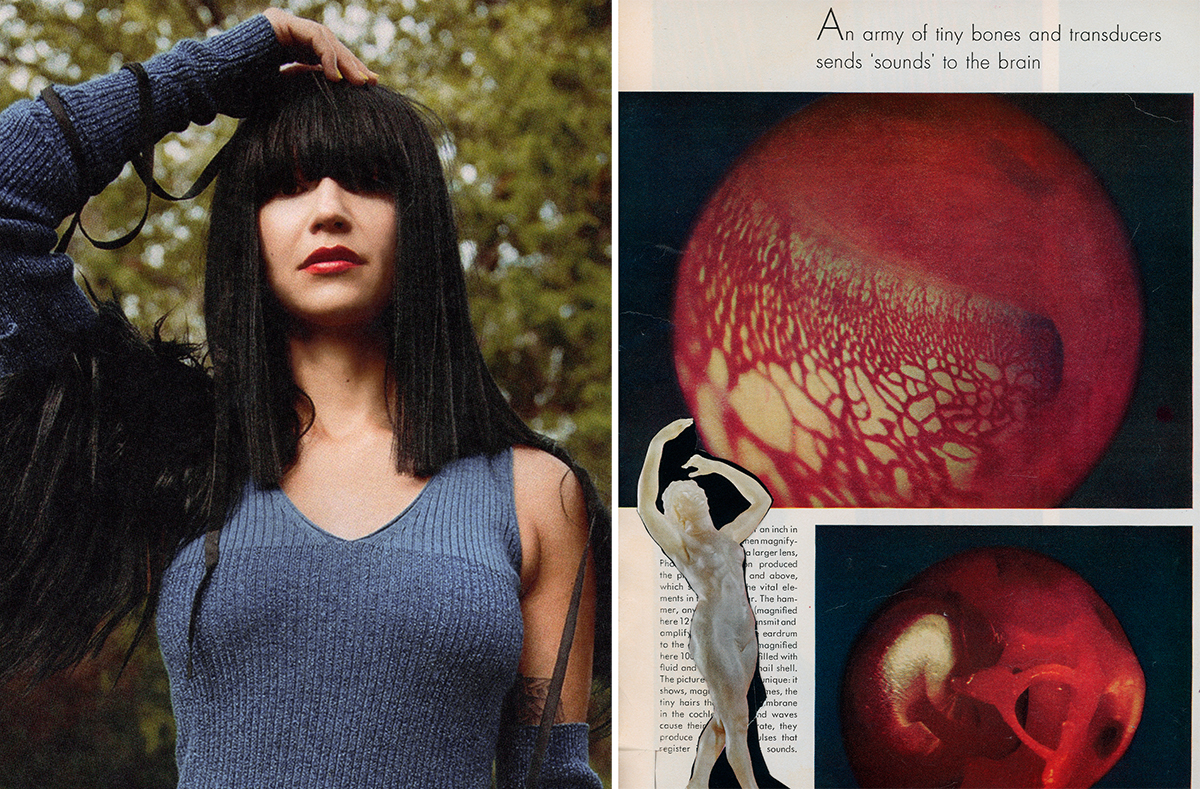
Feather Scarf Ann Demeulemeester, Top Jean Paul Gaultier via Artifact New York
It’s such a joy to watch your favourite bands go through their different phases and to continue evolving.
I think people have, which they should have, mixed reactions to change because that’s just how it is. I think as people, you’re always trying to get back to your child-like self. When you’re finally a grandparent is when you’re closest to how you were as a kid. There’s this thing in Khruangbin, like how do we get back to A Calf Born in Winter? How do we get back to that level of creativity? It’s like well you can’t, you can try but actually it’s better to just be wherever you are at the time, and Mordechai is that. If we had just made another The Universe Smiles Upon You then what’s the point? We already did that. And now I’m hearing all these baby bands that are clearly influenced by Khruangbin. But it sounds like The Universe Smiles Upon You Khruangbin, which is why we had to do Mordechai.
It all seems so effortless, and so I imagine many people believe it was effortlessly made —
Yeah, it’s not. Blood, sweat and tears, literally all three.
Or that it happened overnight.
It’s funny because people definitely said that about us. And I know that once it started happening, it might have seemed that way but we’ve been a band for 10 years. I always believed in it and it took a while, but it’s been great in every iteration.
You can follow Laura Lee and Khruangbin via Instagram and stay up-to-date with their music through their website and Bandcamp.